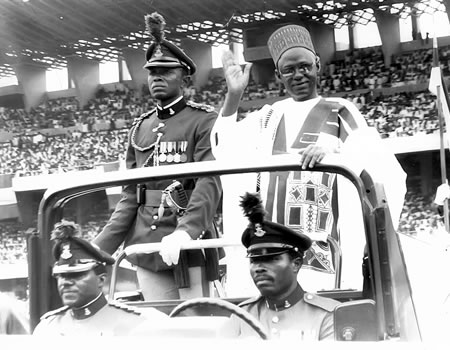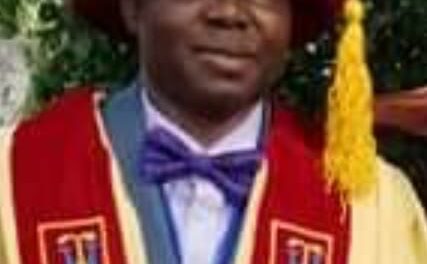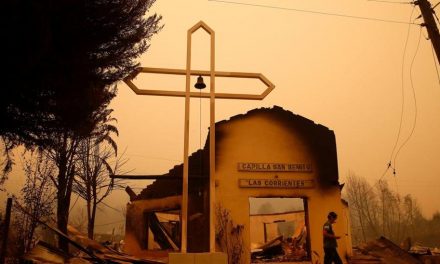The president has the whole nation as his constituency, and he should be above any petty differences between the various sections of the community – President Shehu Shagari
The death of President Shehu Usman Aliyu Shagari the first civilian leader of Nigeria on December 28th, 2018 at Abuja put an end to ‘a conciliator who operated above the daily joust of Nigeria’s politics.’ Shehu Usman Aliyu Shagari, a devout Sunni Muslim and the fifth child of Aliyu and Mariamu Shagari was born on Feb. 25, 1925, in a thatch-roofed house built of sunbaked clay in the village of Shagari. Known for his flowing Islamic robes and distinctive beaded headgear, President Shagari was the first civilian executive president with a ‘bicameral legislature and significant powers given to the governors of the country’s 19 federal states.’ The village of Shagari was founded by Shehu’s forebears near the city of Sokoto in northwest Nigeria.
Shagari studied at a Quranic school, Yaro Elementary School (1931-1935), middle school in Sokoto between 1936 – 1940, and Kaduna College from 1941-1944. He later attended a Teacher Training College in Zaria, Kaduna State from 1944-1952 and returned to Sokoto to teach science at his old school 1953-1958. In 1951 Shagari became the secretary of the Northern People’s Congress in Sokoto, ‘a position he held until 1956.’ He served as a member of the Federal Scholarship Board from 1954-1958. He was elected to the federal House of Representatives in 1954 representing Sokoto West and later held several posts especially as a member of every administration after Nigeria’s independence in 1960 until after ‘a military coup in 1966 ended civilian government.’ He attended a parliamentary course at Westminster, London and obtained a certificate in parliamentary procedure. On his return to Nigeria, he was appointed Parliamentary Secretary to the Prime Minister, Abubakar Tafa Balewa
He was the Federal Minister for Economic Development between 1959 and 1960 before moving to the Pension Ministry a Federal Minister for Pensions 1960 to 1962. Based on ‘his participation in the Muslim pilgrimage to Mecca, which began in 1960,’ the honorific Alhaji was added to Shehu Shagari’s name. He was made the Turaki of the Fula Sokoto Caliphate in 1962 by the Sultan of Sokoto, Siddiq Abubakar III. Shagari served as the Federal Minister for Internal Affairs from 1962 to 1965, and as the the Federal Minister for Works from 1965 until the first military coup in January 1966. Between 1967 and 1969, Shagari served as the Secretary for Sokoto Province Education Development Fund and as Commissioner for Establishments. Under General Yakubu Gowon Shagari took over from Chief Awolowo as the federal Commissioner for Economic Development, Rehabilitation and Reconstruction from 1970 to 1971.
In 1979, in our bid to return to civilian rule under General Olusegun Obasanjo, Shagari as a founder member and the flag bearer of the National Party of Nigeria (NPN) defeated Awolowo of the Unity Party of Nigeria in a disputed presidential elections. Criticised as a ‘figurehead’ for the African most populous nation and for ‘ordering the expulsion of foreigners who had been drawn to Nigeria by its oil wealth’ in the 80s, President Shagari was noted for the theme of liberation politics. He was very passionate to end white minority rule in Africa, especially for South Africa and Namibia. He told Queen Elizabeth II in 1981 ‘in a banquet speech that Nigerians expected Britain to combat “the horrible state of affairs” in apartheid-era South Africa.’
At home and faced with the international economic crisis coupled with the International Monetary Fund stringent policy of the early 1980s, Shagari’s attempt to strengthen the economy could not see the light of the day. On 1980-82 Nigerian religious crisis, the amnesty granted to over 1,000 members of the Maitatsine cult by Shagari could not stop fresh violence and killing of people especially in Northern Nigeria.
After the 1983 elections and under the burden of corruption in his administration, ‘on Dec. 31, 1983, a military coup led by Maj. Gen.Muhammad Buhari toppled the government, and Shagari was arrested. Shagari was cleared of personal corruption charges and released from detention in 1986 but was banned from participation in Nigerian politics for life.’ General Buhari explained that the reason for the coup was that Nigeria had been “enslaved by a handful of people who had been sharing the wealth among themselves and who were determined to stay in office at any cost.” President Shagari has been described as a compromised leader who according to Professor Pat Utomi ‘… had no blemishes on him. He was not particularly ambitious. Power was thrust upon him.”
Among Shagari’s legacy as president in the Second Republic was ‘the construction of a new capital in Abuja, to escape the chaos and tribal affiliations of Lagos, which remained the commercial heart of the country.’ The ideology behind the location and design of Abuja as the new federal capital suggests ‘emblems of unity among the dominant ethnic groups, lying roughly equidistant from the Yoruba heartland in the southwest, Ibo strongholds in the east and the largely Hausa Fulani north.’
President Shagari, a Grand Commander of the Order of the Federal Republic, GCFR who had been a lawmaker, minister, and Chairman of Peugeot Automobile Limited, before becoming President at the age of 54 was a contented leader in contrast to the self-enrichment legacy of African leaders. He did not have the legacy of greed and impunity. It is on note that he rejected the presidential residence. Justice Samson Uwaifo review panel exonerated President Shagari from the alleged official fraud and collection of about ‘$22 million in kickbacks on a $333 million contract with a French construction company, Feugerolle Nigeria Ltd.’ Beyond his permissive nature, humble background, teaching profession and philanthropic gestures, President Shagari was an exemplary leader, a bridge builder with reconcilatory gifting. President Shagari, a former governor of the African Development Bank, a Director of the World Bank, the International Monetary Fund and a member of the Committee of 20 of the IMF was a technocrat, a gentle man, and a servant leader with sterling qualities of honesty and transparency. President Shagari’s legacy of the Green Revolution programme need to be reawaken in order to reduce our dependence on food importations. Please let us remember his family in prayer.











Recent Comments